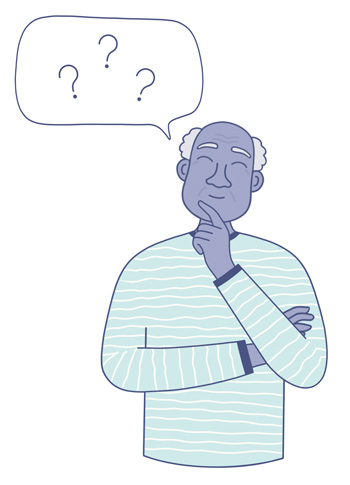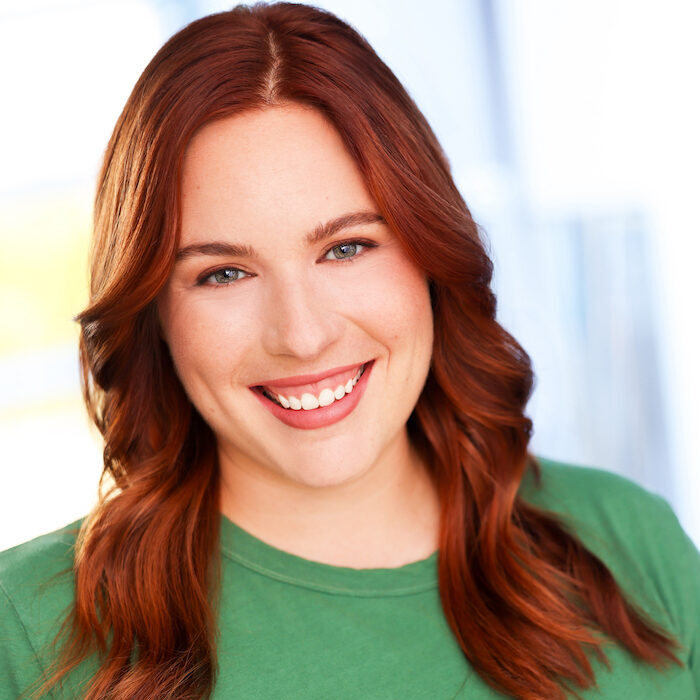It’s super common to discover that your sleep habits change with age. One minute you can party until dawn and pull an all-nighter without thinking twice–the next you’re yawning as soon as you get home from work and find yourself waking up before sunrise. People who previously never napped might find themselves exhausted at midday, or night owls may discover their bedtime getting earlier and earlier over time.
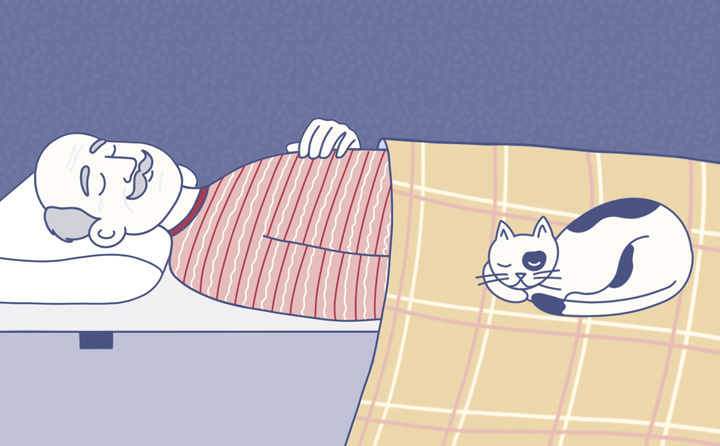
Meanwhile, sleep deprivation can actually speed up the aging process. One 2013 study by researchers at University Hospitals Case Medical Center found a lack of sleep ages your skin. The National Institutes of Health says sleep deprivation can also exacerbate forgetfulness and memory problems.
This creates a bit of a Catch-22: Older adults need sufficient sleep in order to stay as healthy as possible, but it can be harder to obtain sufficient sleep as we age. Luckily, the right information can empower you to develop healthy sleep habits no matter your age. Here’s what you need to know about how your sleep needs change as you get older.
[Editor’s Note: The content provided on this site is for general informational purposes only. Any information provided is not a substitute for professional medical advice. We encourage you to consult with the appropriate health expert if you have concerns.]
How Much Sleep Do I Need For My Age?
The recommended amount of sleep for each age group varies widely. Babies, children and teens need a lot of sleep each night. The American Academy of Sleep Medicine (AASM) recommends:
| Age | Daily Recommended Sleep Time |
| Infants (4 months to 12 months) | 12 to 16 hours (including naps) |
| Toddlers (1 to 2 years) | 11 to 14 hours (including naps) |
| Children (3 to 5 years) | 10 to 13 hours (including naps) |
| Children (6 to 12 years) | nine to 12 hours |
| Teens (13 to 18 years) | eight to 10 hours |
When it comes to adults, the Centers for Disease Control and Prevention (CDC) suggest that:
| Age | Daily Recommended Sleep Time |
| Adults (18 to 60 years) | At least seven hours |
| Adults (61 to 64 years) | seven to nine hours |
| Adults (65 or older) | seven to eight hours |
Do Older People Need Less Sleep?
What is “normal” for someone aged 65 and over depends on a few things. It’s important to remember that people are different and thus generally have different sleep requirements. Generally, experts agree that older adults sleep for less time than younger adults, even though both groups generally need around seven hours of sleep each night.
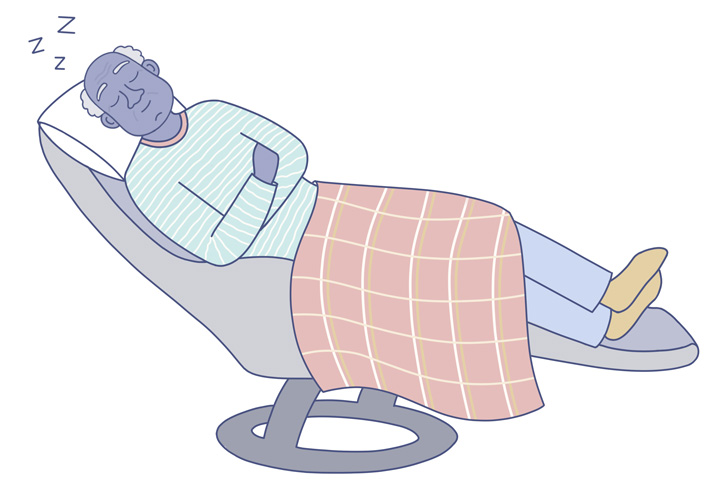
It’s not totally clear what causes these changes, but Dr. Blen Tesfu, a geriatrician, says “older adults may produce less melatonin, which is a hormone involved in regulating sleep-wake cycles.”
Experts aren’t certain why melatonin production often decreases with age, but Dr. Blen Tesfu says it “may involve various factors, including changes in the pineal gland and alterations in the regulation of melatonin synthesis.”
Geriatrician Dr. Brian says urinary interruptions can also negatively impact seniors’ sleep quality and create fragmented sleep patterns. “As people age, changes in bladder function, such as decreased bladder capacity and reduced muscle tone, can contribute to more frequent trips to the bathroom during the night,”
Is it Normal for Elderly People to Sleep More?
Experts agree that older adults (age 65 and up) need around seven hours of sleep each night. However, due to changes in circadian rhythms and time spent in each sleep stage, elderly adults might find themselves experiencing excessive daytime sleepiness because they are constantly short on sleep.
Sleep disorders that are linked to aging, such as insomnia and sleep apnea, can cause excessive sleepiness during the day.
Sleep Stages Evolve With Age
While you are asleep, your body goes through various sleep stages: Stages one through four and then REM sleep.
Typically, stage one is the lightest phase of sleep, and each stage gets increasingly deeper (meaning it’s harder to wake you up). REM sleep is when most of your dreaming occurs. Usually, one full sleep cycle from stage one to REM takes approximately 90 to 110 minutes, so you will repeat the whole cycle a few times during the course of a single night’s sleep.
A long-term study of 9,000 people aged 65+, which was published in the journal American Family Physician, found that elderly adults have more fragmented sleep, and spend much less time in stage three and stage four sleep than young adults do.
Why The Elderly Are Considered “Early Birds”
Dr. Brian explains that “seniors are often considered ‘early birds’ because they tend to have a shift in their sleep-wake cycle as they age.” This can happen for many reasons, “including age-related changes in circadian rhythm and hormonal regulation,” Dr. Brian says.
According to one study, shifts in circadian rhythm can make elderly people feel tired much earlier in the evening, around 7 p.m. This causes them to go to bed early and wake up extremely early—think 3 a.m. or 5 a.m.
Again, we don’t know exactly what causes this, but the study posits a couple of theories:
- One theory is that elderly people spend less time in daylight, which is very important for regulating your circadian rhythms. This particularly applies to elderly people who are in nursing facilities or who have less mobility than they used to and find it a little trickier to get outside. Dr. Brian says, “While there is no specific recommended duration of daylight exposure for older adults, spending time outdoors during daylight hours (. . .) helps regulate circadian rhythms, promotes alertness during the day and supports healthy sleep patterns.”
- Another is that changes in your brain’s hypothalamus as you age can shift those rhythms. One 2001 study, which was published in JCEM, suggests elderly people produce and secrete less melatonin, which affects their sleep/wake cycles.
Circadian Rhythm Changes With Aging
A recent study from the University of Kent in the U.K. suggests that as we age, the part of our brain that controls our circadian rhythms becomes less sensitive to light. This suggests that our struggle to sleep as we get older has its roots in our biology.
As we get older, the area of our brain that controls our sleep/wake cycles changes structurally and becomes less sensitive to light. This impacts our ability to regulate our circadian rhythm and sleep/wake cycle, thus making it harder to sleep as we age.
Sleep Issues Linked to Aging
Multiple factors can affect your sleep as you age. Changes in health, daily routines, sleep schedules and brain function can all affect your sleep as time goes on. Some people aged 65+ may find they don’t get enough sleep, while others will discover they are sleeping far too much.
RELATED: Best Mattress For Seniors
Perhaps because of these changes, a number of sleep issues are common among elderly adults. Here’s an overview of some of the most common sleep conditions affecting adults ages over the age of 65.
Insomnia
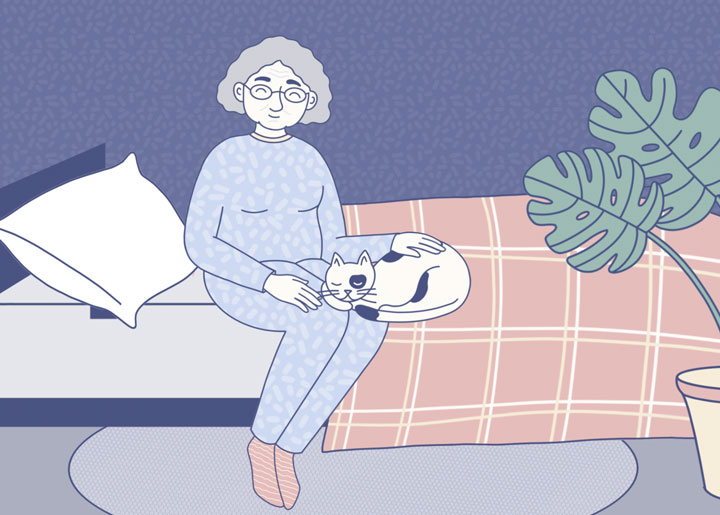
According to the National Institute on Aging (NIA), insomnia is the most common sleep problem affecting people aged 60 and up. Manytimes, medication causes insomnia, but it may also be triggered by health-related anxiety and concerns about aging.
Common symptoms of insomnia include:
- Taking a long time to fall asleep at night
- Waking up several times throughout the night
- Waking up early and not being able to fall asleep again
- Waking up feeling tired
- Feeling very sleepy throughout the day
One 2006 study published in the American Journal of Medicine suggests older people might experience these symptoms but consider them a normal part of aging, thus preventing them from seeking help. If you are experiencing symptoms of insomnia, speak to your physician about potential treatments (such as tweaking your daily schedule and strengthening your sleep hygiene habits).
Medications
As one study suggests, different types of medication can sometimes act as stimulants, thereby causing sleep problems. These categories of medication include:
- Antidepressants, which are used to treat depression and anxiety, can sometimes disturb sleep
- Decongestants, which are taken to relieve nasal congestion, can sometimes make you excessively sleepy
- Bronchodilators, which treat breathing issues, have been linked to occasional insomnia
- Antihypertensives, which are taken for high blood pressure, can sometimes cause insomnia
- Corticosteroids, which are taken for inflammation, can also cause insomnia
Sleep Apnea
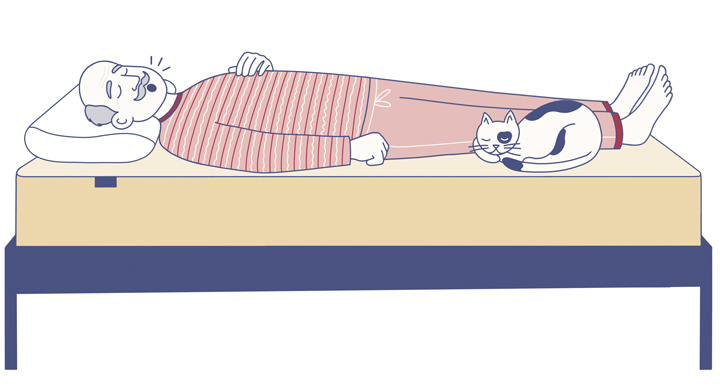
Sleep apnea is a condition where your breathing is obstructed or starts and stops during sleep. Men, older adults and overweight adults are at an increased risk for developing sleep apnea. There are three main types of sleep apnea:
- Obstructive sleep apnea, which is caused by muscles in your throat relaxing so that it’s harder for air to pass through your airway
- Central sleep apnea, which happens when your brain does not send the right signals to the muscles in your body that control breathing
- Complex sleep apnea (also sometimes called treatment-emergent central sleep apnea), which is when you have both obstructive sleep apnea and central sleep apnea
A 2008 study, which was published in Clinics in Geriatric Medicine, found that elderly people might be less likely to seek treatment for sleep apnea because they might attribute common symptoms—including “snoring, sleepiness, fatigue, nocturia, unintentional napping, and cognitive dysfunction” —to the aging process.
The most common treatment option for sleep apnea is a continuous positive airway pressure (CPAP), which involves wearing a mask during sleep to help keep your airway open so you can breathe. Other options include oral appliances that open your throat by bringing your jaw forward, or even surgery to remove obstructive tissue or reposition your jaw. Surgery is typically a last resort for treatment.
Restless Legs Syndrome
Restless Legs Syndrome (RLS), which is also called Willis-Ekbom Disease, is a condition that creates an urge to move your legs. The condition is significantly more common in elderly people: One 2002 study from the journal Drugs & Aging estimates that up to 35 percent of individuals over 65 years of age have it.
People experience RLS in a variety of different ways, but symptoms can look like any of the following:
- Sensations that occur after the body is at rest
- Feeling relief through movement
- Symptoms increase at the end of the day
- Twitching legs overnight
The sensation is often described in the following ways:
- Crawling
- Creeping
- Pulling
- Throbbing
- Aching
- Itching
- Electric
When symptoms are bad enough to disrupt sleep and generate daytime drowsiness, it’s time to call the healthcare provider to talk about treatment options.
Sometimes treating an underlying condition, like iron deficiency, can lessen the symptoms of RLS. If this doesn’t work, a doctor may prescribe lifestyle changes like baths, massages, exercising and avoiding caffeine. In some instances, a doctor will prescribe medication when other more natural options have been exhausted.
Hypersomnia
Hypersomnia can mean either excessive daytime sleepiness or excessive time spent sleeping.
One 2012 study from the journal SLEEP found that excessive sleepiness could help predict cognitive decline in elderly people. A few medical conditions can cause you to sleep a lot, including:
- Depression
- Diabetes
- Thyroid problems
- Heart disease
Underlying Medical Conditions
Certain medical conditions can affect how well you sleep, as well as how tired you feel and how much sleep you need. For example:
- Depression can cause people to feel more tired than usual.
- Pain from arthritis might make it harder to fall asleep.
- Medical conditions that cause you to urinate more frequently and may mean you wake up more often at night to go to the bathroom, disrupting your sleep.
Poor Sleep Hygiene
It’s possible that less-than-ideal sleep hygiene habits are affecting your sleep more than you think. Learn more about how to adopt effective sleep hygiene below!
The Importance Of Sleep As You Age
Sleep is important for everyone, as it’s crucial for your memory, cognitive function and ability to learn. Getting adequate sleep also puts you at a lower risk for health issues, such as heart disease, kidney disease, high blood pressure, diabetes and stroke.
This can be especially relevant for older adults who are more likely to have chronic health issues than younger people. Plus, according to the National Institute on Aging, sleep deprivation in older adults can contribute to:
- Feeling irritable
- Experiencing memory problems or being forgetful
- Feeling depressed
- Falling more often, or having more accidents
[Editor’s Note: The content provided on this site is for general informational purposes only. Any information provided is not a substitute for professional medical advice. We encourage you to consult with the appropriate health expert if you have concerns.]
Sleep Aids
If you are struggling to fall asleep or stay asleep, there are many potential remedies and treatment options based on what is bothering you. If an underlying medical condition is causing your sleep problems, treating that condition may resolve the sleep issues. Lifestyle changes can also be helpful. Here are a few other ways to treat sleep issues.
Sleeping Pills
People with serious sleep issues may be prescribed pills to help them sleep. According to the Cleveland Clinic, the most common type of sleeping pills come from a class of drugs called benzodiazepines
It’s important to note that sleeping pills can have serious side effects including daytime drowsiness, oversleeping, allergic reactions, and sleepwalking or doing activities in your sleep such as driving, eating and even having sex while you are not awake.
Therapy
According to the Mayo Clinic, some forms of therapy—especially cognitive behavioral therapy (CBT)—can help with sleep disorders such as insomnia. CBT helps treat the underlying causes of sleep disorders, rather than just finding solutions for the symptoms.
There are multiple techniques involved in CBT-I, such as restricting yourself from naps and making yourself stay up until a much later hour than usual, following sleep hygiene rules, improving your sleep environment and teaching yourself how to relax. If you’re curious about CBT-I, it’s important to consult a licensed therapist.
Natural Remedies
There are numerous natural remedies you can try to help you fall asleep, stay asleep, and wake up more easily. Some common natural sleep remedies include:
- Melatonin supplements. Your body naturally produces melatonin to help you sleep, and the idea is that taking supplemental melatonin will make it easier to fall asleep. It’s important to note that dietary supplements are generally not regulated and haven’t undergone testing the way medications have. Many bottles of melatonin are mislabeled, making it difficult to know how much melatonin you are actually consuming.
- Chamomile tea. People have sipped on chamomile tea for hundreds of years, and studies suggest it can help people relax and unwind before bedtime.
- Magnesium supplements. Does magnesium help you sleep? Many studies suggest magnesium can lower stress levels, which can lead to a better night’s sleep.
- Meditation. Research suggests that following a mindfulness meditation program can help combat insomnia and lead to better sleep. If you don’t know where to start, there are many free guided meditations available online that are specifically designed to help you sleep.
- Exercise. Aerobic exercise has been shown to improve sleep quality in older adults with chronic insomnia. Check out our senior exercise guide to learn more.
Tips For Good Sleep Health
The Cleveland Clinic recommends trying various lifestyle changes and practicing good sleep hygiene before speaking with your doctor about medication to help you sleep. Some of their tips for good sleep hygiene include:
- Avoiding caffeine and nicotine in the evening, as these substances can stimulate you and keep you awake. Caffeine affects everyone differently, but it’s a good rule of thumb to avoid caffeine after 2 or 3 p.m. If you regularly enjoy hot drinks in the evening, switch to decaf coffee or herbal tea
- Following a regular sleep schedule where you wake up and go to sleep at the same time every day, even on weekends
- Avoiding naps whenever possible, especially in the late afternoon
- Staying away from alcohol and heavy meals right before bed
- Exercising earlier in the day, rather than in the evening or before bed
- Keeping your bedroom dark, cool and quiet, which helps create a calm and comfortable place for you to sleep and makes it less likely that you will wake up due to a noise or feeling too hot or cold
- Staying away from digital screens before bed. These screens emit a blue light that can interfere with melatonin production, thus making it harder to fall asleep
- Winding down before bed by reading, meditating or doing yoga.
- Choosing an excellent mattress is never a bad decision. Seniors may want to consider shopping for one of the best bed-in-a-box mattresses. These options conveniently ship to your front door.
Additional resources
To learn more about sleep and aging, check out the following sites and webpages:
- A Good Night’s Sleep (The National Institute on Aging)
- Tips For Sleeping Better As You Get Older (WebMD)

